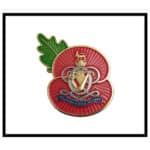All those who had the privilege of knowing Mike Eveleigh in The Third Hussars will remember him as a true friend and a brilliant leader in war. In training he was clear-thinking, patient and an expert teacher; in action, he was always calm, decisive and totally unflappable.
At all times he was cheerful and good-humoured with a bedrock of sound commonsense. His bravery and determination were an example to all and an inspiration to all those fortunate enough to serve in his Squadron.
He was born in 1914 and after Rugby and Sandhurst joined the 17th/21st Lancers in India in 1934. He was immediately recognised as an extremely able and sympathetic horseman with a particular talent for re-training and reforming difficult horses.
He distinguished himself at pig-sticking and while a good polo player, he always believed that the fun of playing was far more important than the desire to win at all costs.
The 17th/21st was mechanised in 1938 and returned to England in 1939. By 1942 they had seen no action and Michael volunteered to go to the Middle East so that he could take an active part in the War.
On arrival in Cairo, he met Peter Farquhar, who had just been selected to command the 3rd Hussars, agreed to join immediately without the formality of a posting order and within a matter of days was engaged in the battle of El Alamein as 2IC of ‘B’ Squadron.
After Miteriya Ridge he was appointed Squadron Leader and distinguished himself during the attack at Tel el Aqqaqir on the morning of 2nd November. After his tank had been knocked out in the penetration of the German gun line he made his way back to the Colonel’s Sherman and then took messages on foot under heavy fire to the few remaining tanks still in action.
He was awarded the MC.
In Italy in 1944 the results of his training were evident when ‘B’ Squadron fought a highly successful series of copybook actions; firstly in support of the London Irish Rifles, when he led the way on foot through a country considered impassable to armour and then, notably, at Citta Della Pieve and Citta di Costello.
He was Mentioned in Dispatches for his gallant and distinguished services in Italy.
In August 1944 he became Second-in-Command of the Regiment and left to go to the Staff College at the end of the year. Regrettably, he never returned; he would have been an outstanding Commanding Officer.
After the war he farmed in Gloucestershire for some years and then was employed by the Jockey Club, ending up as Senior Starter. Here the qualities shown in the war of always remaining calm and cheerful yet decisive were invaluable and he earned the respect and friendship of jockeys, officials and race-goers alike.
He died on 29th December 1993 and is survived by his two sons and his daughter. To them and to all his family we extend our deepest sympathy.



